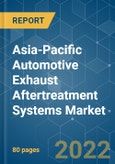The Asia-Pacific Automotive Exhaust Aftertreatment Systems Market is anticipated to register a CAGR of around 9% during the forecast period.
Key Highlights
- The technological level for the Automotive Exhaust Aftertreatment Systems Market has evolved with modern engine design and active exhaust gas after-treatment systems. As a result of all this, there is a decrease in exhaust emissions from automobiles. Although, with continuous production in vehicle numbers and with car ownership reaching an all-time high, the challenges for scientists and engineers to develop further improved exhaust after treatment systems have been much focused and researched upon.
- Asia-Pacific dominated the automotive exhaust aftertreatment systems market in 2019, accounting for more than 35% of the market share. Even though the automobile production growth rate has plummeted over the last few years, but countries such as India, China, and the rest of South Asian nations have seen an upward growth rate. This is primarily because of its rise in population, improved opportunities, affordability, and higher GDP growth rate.
- However, with the present scenario of COVID-19 outbreak, the automotive exhaust aftertreatment systems market and the entire automobile market is experiencing a negative growth rate. Nevertheless, with the emergence of electric vehicles and an increasing ban on diesel vehicles, especially in the developed nation, the growth for Exhaust Aftertreatment Systems, the market will face challenges.
Key Market Trends
Stringent Emission Regulations Driving the Market
When compared to gasoline, diesel engines operate with much higher efficiency and durability. However, diesel engines are also one of the largest contributors to harmful exhaust emissions causing environmental pollution.
Driven by growing concerns on deteriorating air quality, various policies have been imposed worldwide to reduce effects of diesel engine emissions on human health and environment. Measures are being taken across the globe to adopt and enforce tighter vehicular emission regulations. The main aim is to minimize unburned hydrocarbons, nitrogen oxides (NOx) and particulate matter (PM).
Japan and South Korea have advanced regulations which focus on limiting the pollutant. With improved technology and awareness, the intensity to limit global warming and reduce fossil fuel use in the transportation sectors on the rise. Several Asian nations have pledged to carbon dioxide emissions and impose Carbon tax criteria for greenhouse gases and pollutants emission automotive carmakers. This is leading to the rapid adoption of advanced after treatment technologies.
In order to limit emissions, countries are mandating stricter emission norms to reduce air pollution. In India, the Ministry of Road Transport and Highways has released rules for non-road Bharat Stage (CEV/Trem) IV and V emission standards. Various such measures are being take in an effort make strict emission limits on particulate matter, nitrogen oxide, hydrocarbon, and carbon monoxide.
China Poised to be the fastest-growing market in Asia-Pacific Region
Although advanced diesel Aftertreatment-treatment devices have made a significant mark in the developed countries, other economies such as China have also become a lucrative opportunity for the carmaker of tomorrow.
One of the significant demands for the automotive exhaust system is the rise in air pollution globally. Moreover, China contributes to around 22% of the CO2 emission. When carbon doesn’t burn completely, vehicles emit carbon monoxide. Also, automotive exhaust comprises hydrocarbons, NOX, and other particulate matter.
China is also the world’s largest automotive market, accounting for more than 32% of the global passenger vehicle sales and 15% of the global commercial market sales.
As a result, China targets a reduction of 50% for hydrocarbons, 40% for Nitrogen Oxides (NOx), and 33% for particulate matter over Euro 6 Levels. New gasoline vehicles in China are made mandatory to meet the regulations. All these factors are expected to help the market grow.
Competitive Landscape
The Asia-Pacific Automotive Exhaust Aftertreatment Systems Market is fragmented with international and regional players such as Delphi Technologies PLC, Cummins, Tenneco Inc., Donaldson Company, Bosal Group, NORMA Group, John Matthey and Magneti Marelli. As the demand for Automotive Exhaust Aftertreatment Systems is growing in the region, the OEM manufacturers are trying to have the edge over its competitors by making joint-ventures, partnerships, launching new products with advanced technology.
NORMA Group received a large order in India for the development and manufacture of exhaust after treatment products. NORMA Group will develop urea transport systems and exhaust gas clamps with leading specialists in the exhaust after treatment solutions. These will help meet the stricter emission requirements of India’s Bharat Stage VI emissions standard from 2020. By 2024, some 250,000 vehicles per year will be equipped with NORMA Group products.
Additional Benefits:
- The market estimate (ME) sheet in Excel format
- 3 months of analyst support
This product will be delivered within 2 business days.
Table of Contents
Methodology

LOADING...








